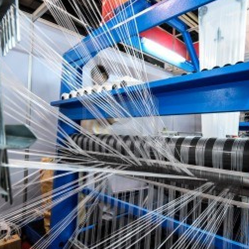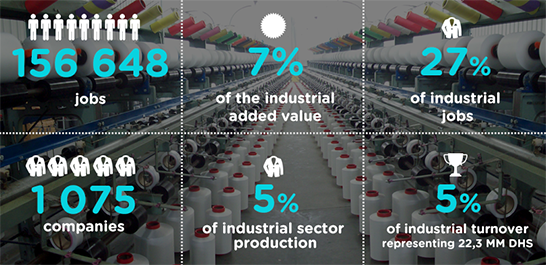INTRODUCTION

The textile sector is of strategic importance as it largely contributes to the national industry aggregates (27% of jobs and 7% of the industrial added value).
Considering the context of the economic crisis hitting principal partners (notably Spain and France which account for nearly 60% of exports in the sector), the textile and leather sector has proven to be quite resilient.
With a view to attracting better profits from its potential and to assure a sustainable growth, the state has developed a comprehensive vision, integrating both the export and the domestic market, an objective pursued within the framework of Industrial Acceleration Plan 2014-2020.
Ongoing support will be especially drawn to the emergence of a competitive and innovative textile sector, able to draw more foreign direct investment, notably Chinese, and develop win-win partnerships.
Professional association of the sector:
Moroccan Association of the Textile and Apparel Industries (AMITH) (www.textile.ma)
Main companies of the sector:
FRUIT OF THE LOOM, DÉCATHLON

Ecosystems
Ecosystems, the cornerstone of the Industrial Acceleration Plan 2014-2020, are designed to reduce sectoral fragmentation and to promote integrated development of industrial activities. The aim is to integrate the local industrial fabric around leading companies by encouraging mutually beneficial partnerships with SMEs, first by acting as catalyst and second by providing perspective and visibility, which in turn bring creativity, a sense of innovation and dynamism.
Appropriate and targeted support is provided to companies in the ecosystems regarding finance, industrial land and training.
The Industrial Development Fund (FDI), operational since 1 January 2015, allocates 3 billion dirhams per year for the period 2014-2120 to ecosystem companies to enable them to realize their ambitions in upgrading, development and internationalization.
State support is also backed up with integrated and competitive bank financing.
Ecosystem companies can also :
Six ecosystems were set up, to date, in the textile industry.:
The growth targets that have been set for 2020 are:
The creation of ecosystems in these sectors will encourage the development of an upstream competitive and innovative textile sector which is a prerequisite for better integration of the sector thus improving its responsiveness and providing better control of logistics costs for supplying clients.
-
- access to quality industrial property, thanks to an innovative rental industrial parc concept
- employees benefit from proper training/
- Denim
- Fast Fashion
- Industrial distributors of national brands
- Mesh
- Home textiles
- Textiles for technical applications
- The creation of 100.000 new jobs,
- Achievement of 5 billion dirhams of turnover .
ASSISTANCE AND SUPPORT
Integrated and innovative support measures have been implemented to benefit the textile ecosystems:
Tailored financial support:
An integrated and competitive banking offer:
An agreement was concluded between AMITH/Banque Populaire in June 2015 to develop innovative financing solutions for the benefit of textile operators.
Targeted training strategy:
deployment of training programs tailored to the new needs of the sector.
Attractively priced rental property:
95 hectares of rental property reserved for the textile industry.
For leather ecosystems, the planned support perfectly fits the needs and expectations of operators and aims at :
Under the Investment Charter, the FPI offers partial coverage by the Government of certain expenses related to the acquisition of property (up to 20% of the cost of land), external infrastructure (up to 5% of the total amount of the investment programme, or 10% in the case of an investment in the sector of spinning, weaving or finishing) and vocational training (up to 20% of the cost of the training).
These contributions may be combined as long as the total contribution of the state does not exceed 5% of the total investment programme; or 10% in the case of investment in the sector of spinning, weaving or finishing; or when the investment project is located in a suburban or rural area.
Eligibility criteria:
The investment project must meet at least one of the following five criteria:
To be located in one of the provinces or prefectures mentioned in Decree No. 2-98-520 dated 5 Rabii I 1419 (30 June 1998);
Tax incentives are provided for by article 123-22°-a) of the General Tax Code and Article 7.1 of finance law No. 12-98 for the 1998/9 budget year as amended and supplemented by the following:
SMEs in the sector may benefit from special support within the programmes developed by Maroc PME:
-
A free trade zone (ZFE) is a specified area of land devoted to export activities for industrial purposes and related service activities. Each free zone is created and delimited by a decree that determines the nature and business activities that can be established there.
The operational free trade zones are located at Tangier (Tanger Free Zone – TFZ and Tanger Automotive City – TAC), at Kenitra (Atlantic Free Zone – AFZ), at Casablanca (Midparc), at Rabat (Technopolis) and at Oujda (Technopole d’Oujda).
To obtain free zone status under law No. 19-94, companies must have obtained authorization from the local commission of the free export zone, which is presided over by the wali or governor of the region, and must make at least 70% of their turnover from exports.
Free zone status allows for the exemption of foreign trade and exchange controls, as well as access to the following state aid:
Tax incentives resulting in:
Customs benefits:
Administrative facilitations:
-
- Investment incentives.
- Incentive to conquer export markets.
- Support for innovation and creativity.
- Support for material investment (property, construction, installations, machines, commercial networks for national brands…) and immaterial investment (creativity, innovation, design, technical assistance…), through the Industrial Development and Investment Fund (FDII). This support takes the form of direct aids, financing up to 30% of the overall tangible and intangible investment.
- Strengthening the Morocco offer through the Moroccan Investment Development Agency and Maroc Export.
- Upgrading the regulatory framework and the introduction of quality labels,
- Structuring the upstream sector,
- The deployment of best efforts for the integration of the informal sector (under-invoicing on imports, support for small business and self-entrepreneurs ...),
- The establishment of a training scheme, in partnership with training institutions, including OFPPT,
- Access to property at an attractive price (96,7 hectares reserved for the sector).
- Access to bank financing through the development of an integrated offer dedicated to investment and operating funding,
- Backing of the sector’s SME’s and self-entrepreneurs as part of the Government/ANPME (National Agency for the Promotion of Small and Medium-sized Enterprises) agreement 2015-20120
- Encouraging foreign clients, the customers of the ecosystem’ of companies, to settle down and open sourcing offices in Morocco.
- Represent an amount of 200 million dirhams or more over a 3-year period;
- Create a minimum of 250 stable jobs over 3 years;
- Provide technology transfer;
- Contribute to the protection of the environment.
- The exemption from import duty on capital equipment, materials and tools necessary for the implementation of an investment project with a total cost greater than 200 million dirhams during 36 months after the signing of the investment agreement; this exemption is extended to parts, replacement parts and accessories imported at the same time as the aforementioned equipment;
- The exemption from VAT on imports of capital equipment, materials and tools necessary for the implementation of an investment project with a total cost greater than 200 million dirhams until 36 months after the start of activity by the company or from the date of issuance of the building permit, and which may be extended by six months in the event of force majeure (renewable once); this exemption is extended to parts, replacement parts and accessories imported at the same time as the aforementioned equipment.
- IMTIAZ CROISSANCE
- ISTITMAR CROISSANCE
- AUTO-ENTREPRENEUR
- Exemption from income tax (IR) during the first 5 years, and then a reduction of 80% of tax on gross earned income during the following 20 years;
- Exemption from corporation tax (IS) for the first 5 years, and then a rate of 8.75% for the following 20 years;
- Exemption from professional tax for the first 15 years;
- Exemption from urban tax for the first 15 years;
- Exemption from participation in national solidarity;
- Exemption from tax on income from corporate rights, dividends and similar income for non-residents and a reduction in tax to 7.5% for residents;
- Exemption from import duties, and simplified customs procedures;
- Unlimited exemption from value added tax in respect of products delivered and services supplied to the free export zones and from the subjected territory;
- Exemption from registration fees and stamp duty on instruments of incorporation or increases in the capital of the company, as well as on land acquisitions;
- The establishment of a one-stop service to the investor.
-
TRAINING
The training of human resources is a strategic activity of the Industrial Acceleration Plan 2014-2020. The availability and quality of human resources determine the attractiveness of Morocco as a destination, and increase the productivity and competitiveness of the companies.
Amongst other things the strategy aims at providing the ecosystems in place with skilled profiles.
The detailed mapping of training needs - with a quantification of the human resource requirements by sector, profile, region and year - and the identification of training opportunities available in Morocco are ongoing, which will enable the development of a national training plan.
As for textiles and leather, a training scheme for fashion design aimed at the international market is provided by the Casa Moda Academy (CMA) at Sidi Maarouf in Casablanca, the first public higher education establishment of fashion design in Morocco.
Details of the CMA:
-
- Types of training: initial and continuing;
- Method of governance: public-private partnership (delegated management);
- Capacity: 90 places;
- Starting date: October 2010.
Consult the list of training needs for performance contracts signed by end - May 2017
Reception Infrastructure
In the framework of the Industrial Acceleration Plan, the Ministry plans for the mobilization of 1,000 hectares to create Integrated Industrial Rental Parks (PIL) with turnkey premises: each park will include a one stop shop for administration, a local job pool, ad hoc services and a training programme.
In parallel, general and sectoral Integrated Industrial Platforms (P2I), possibly benefiting from the free zone status, guarantee the availability of property at an attractive price, comprehensive and diverse real-estate and logistics options conforming to the best international standards, as well as on-site services and a one stop shop for administration.

